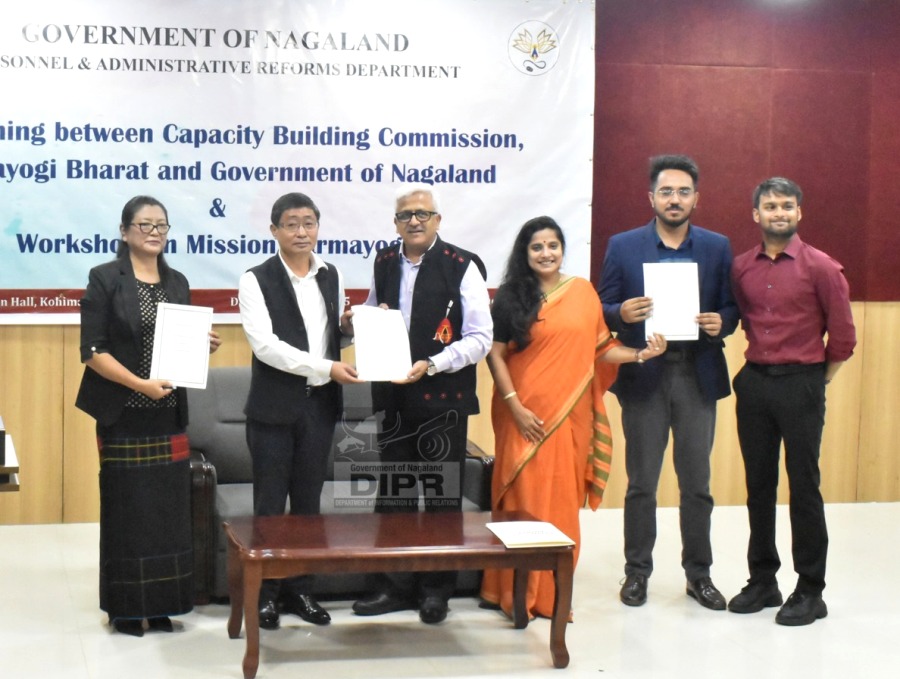Nagaland government signs MoU with Capacity Building Commission to implement Mission Karmayogi and strengthen civil service training.
Share

DIMAPUR — A memorandum of understanding (MoU) between the Capacity Building Commission, Karmayogi Bharat, and the Government of Nagaland was signed, followed by a workshop on Mission Karmayogi organised by the Department of Personnel and Administrative Reforms at the Capital Convention Hall, Kohima, on Wednesday.
According to a DIPR report, speaking on the occasion, Chief Secretary of Nagaland, Sentiyanger Imchen, stated that Mission Karmayogi aims to build a competent and future-ready civil service that ensures effective and efficient public service delivery and equity.
He said that most states have entered partnerships with the Capacity Building Commission to train and build the capacity of their officials.
Imchen informed that the Department of Personnel and Administrative Reforms and the Administrative Training Institute have recently started training programmes for government officials, describing it as a step in the right direction for capacity building in Nagaland. He noted that regular and need-based training empowers officers with updated knowledge, functional skills, and the right attitude to handle complex governance issues.
He mentioned that registration and training modules will be conducted through a digital platform called iGOT Karmayogi and encouraged all officers to continuously update their skills and knowledge. Imchen highlighted that officers’ reluctance to attend training courses outside the state could be addressed through platforms like iGOT, which would enable access to quality learning resources even in remote districts, thereby making capacity building more inclusive and impactful.
Also read: Nagaland government defers police recruitment for four non-Naga tribes pending enumeration
He added that the Department of Personnel and Administrative Reforms, training institutes, and other departments would be able to maintain a database of officers and their completed trainings, which would contribute to performance assessments. The Administrative Training Institute and the Department of Personnel and Administrative Reforms will serve as the implementing and monitoring agencies for Mission Karmayogi in the state.
However, Imchen stressed that the success of the mission would depend on the participation of all departments and officials. He urged administrative heads of departments (AHoDs) and heads of departments (HoDs) to prioritise and institutionalise training within their departments and to view training not as a secondary activity but as an essential investment for effective governance and service delivery.
The chief secretary expressed gratitude on behalf of the state government to Dr. Ramaswami Balasubramaniam, Soumi Banerjee, and their team for their commitment, expressing hope that the MoU would mark the beginning of a long and fruitful partnership in strengthening governance and capacity building in Nagaland.
Director of the Administrative Training Institute (ATI), Akunu S Meyase, presented a summary on “Capacity building initiatives and capacity building infrastructures for state department officials.”
Meyase explained that ATI Kohima serves as the apex training centre in the state, providing training on general administration and governance topics, while technical training institutes in some departments conduct domain-specific training.
She outlined existing initiatives, including foundational training for new recruits in the state civil services, secretarial services, and clerical services; capacity building for officers across departments; mid-career programmes; and training for groups A, B, C, and D. These programmes are based on the training needs communicated by departments, and often involve coordination with national and state training institutes to bring resource persons to Nagaland or send officers for specialised exposure programmes elsewhere.
She informed that ATI Kohima is developing a web portal in collaboration with the Information Technology and Communication department to capture the training history and requirements of all employees, linked to the Personal Information Management System. This would allow for more effective training design and delivery. Meyase urged administrative heads and HoDs to cooperate with training nominations and ensure that nominated officers complete their training courses.
Dr. Ramaswami Balasubramaniam, member-HR, Capacity Building Commission, briefed the participants on Mission Karmayogi’s orientation. He elaborated on the mission’s aims, motives, framework, capacity-building plans (CBP approach), Karmayogi Competency Model, and the NSCSTI-Eight Pillars for Standardisation.